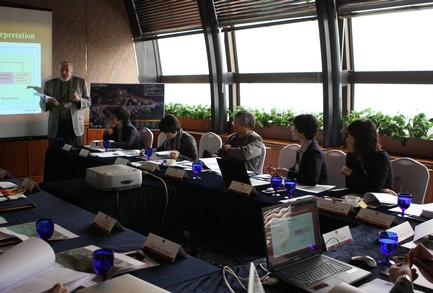John Veverka & Associates
Main menu:
- Home Page
- Our Range of Services
- Interpretive Coaching
- Interpretive Planning
- Interpretive Plan Outline
- Interpretive Training
- John Veverka Resume
- NEW Advanced Interp. Text Book
- InterpNEWS
- Library
- JVA NEWS, Courses and Updates
- Certificates
- Planning/Design of Interpretive Panels
- Interpretive Writing
- Interpretive Writing Course
- Interpretive Trails Course
- Interpretive Panels Course
- Introduction to Heritage Interpretation Course
- Interpretive Planning & Design of Marketing Brochures Course
- Training for Interp. Trainers
- Interpretive Exhibits Course
- Interpretive Master Planning Course
- Interpretive Planning for Scenic Byways.
- Critiquing and Coaching Interpretive Staff
- Advanced Interpretive Planning
- Interpretive Training Center Course Catalogue
- Interp. for International Visitors course.
- Interpretive Exhibits Evaluation
- Interp. Center Feasibility Analysis Course.
- Interp. for Commercial Tour Providers
- Interpretive Researchers Guide for Visitor Studies
- Interp. Planning for Historic Homes
- Heritage Interpretation Training Center
- Interpretive Planning for Botanical Gardens
- An introduction to planning and presenting live interpretive programs and tours for Museum/Heritage Site Docents and Volunteers.
- Developing Marketing Plans for Heritage & Tourism Sites and Attractions
- Interpretation Book Store
- Heritage Interpretation Resource Center
- Interpretive Planning for Historic Farms
- Developing Successful Partnerships
- Developing Interpretive Outreach Programs
- Community Interpretation Planning
- Interpreting Gravestones and Historic Cemeteries
- Using Interpretation to Accomplish Management Objectives.
- An Interpreters Guide for Survival Economics.
- Innovative Strategies for Interpretive Media and Services Planning.
- A Curators Guide for Developing Gallery Tours.
- Advanced Interpretive Writing - Technical Publications
- Advanced Interpretive Services for Managers, Supervisors, Team Leaders and Sr. Staff.
- Advanced Interpretation for Chiefs of Interp. - Interpretive Managers - Regional Interp. Specialists
- Interpreting Critical Issues.
- Developing Commercial Interpretation for Resorts, Cruise Ships, Campgrounds and Tourism Attractions.
- Planning and developing a new commercial tour guiding business.
- Interpretive Evaluation, Visitor Studies and Site Assessment Center
- The Center for Interpretive Planning Advancement & Excellence.
- Developing Requests for Proposals (RFPs)
- Planning and Facilitating Focus Workshops
- Planning for Interpretive Experiences
- 40 Years a Heritage Interpreter
- Interpretive Techniques - The Rest of the Story Course
- Certified Professional Interpretive Planner Certificate
- Certified Professional Interpretive Program
- Certified Professional Interpretive Writer certificate program.
- Visitor motives for attending interpretive programs.
- Exhibit Rehab Course
- Developing Training Workbooks & Manuals
- Planning for Railroad Museums and Sites.
- Climate Change Interpretation Course.
- When there's nothing left but the story - interp. storytelling.
- Interpreting Legends Myths and Fables
- InterpSHARE - Seminars 2022
- Interpreting Invasive Species
- Interpretiing Edible Insects
- Interpretaive Planning for Climate Change
- HITC Climate Crisis Resource Center
- PUP Members Only
- Starting a new Interp Consulting Business
- Panels 4 Week Course
- Interpretive Writing - 4 Week Course
- Marketing - 4 Week Course
- Intro to Interpretation - 4 Week Course
- Interp Climate Change - 4 Week Course
- Exhibit Rehab 4-Week Course
- Level 1
- Johns Interpreters Blog
- John Interpreters Blog 2
Developing Successful Partnerships
Error File Open Error
Heritage Interpretation
Training Center
Developing and Managing Successsful Partnerships for
Heritage Interpretation Agencies and Organizations
Twelve Units, 3 CEU Credits ($300.00 USD)

In today's world of financial challenges, many agencies look toward developing partnerships with other organizations, agencies, business entities and volunteer friends groups to help them accomplish their missions while reducing overhead costs. In considering such efforts, it is to the benefit of organizations to use/develop formal partnership agreements, including agreements for volunteer "friends of..." organizations designed to help sponsor and support agency work, such as sending staff to interpretive conferences or purchasing equipment. It is the goal of this course to help agencies new to considering and developing partnerships or friends groups understand how partnership agreements work, their benefits and their contractual needs. As part of this course we will coach you in developing your partnership plan and help you develop your partnership documents such as a "Memorandum of Understandings" or "Cooperative Agreements".
If you're interested in this course, visit with me at: https://youtu.be/Jc7q0q2qtXg
Resources you will be provided with:
* John Veverkas new (2013) college textbook Two Volume e-book Set:
* Interpretive Master Planning - Strategies for the New Millennium
* Interpretive Master Planning - Philosophy, Theory and Practice.
* Copies of completed partnering agreement and friend group management forms.
* Additional handout materials.
Who is this course for?
* Individuals, agencies or organizations that may currently be involved in the development of partnership agreements and cooperative agreements.
* Individuals, agencies or organizations that are planning on developing partnership opportunities in the future for their agency or organizatiion.
* Individuals (consultants) offering interpretive planning services who do not possess a college level
degree in interpretive services management or have little or no training in development of partnership
agreements.
* Any individual interested in advancing their knowledge and skill level in heritage interpretation in the area of developing partnership agreements or volunteer group management.
This course will:
* Guide you in developing your partnership agreement (with HITC coaching and support),
* Give you expertise in developing and managing partnership agreements.
* Give you specific details of what should be in an different partnership agreements for interpretive
agencies and organizations.
* Give you a skill level in reviewing current partnership agreements.
Course Goals:
Participants will:
- Understand the partnership agreement development options.
- Understand the components of different partnership agreements.
- Gain an understanding of developing partnership agreements and benefits relationships.
- Learn the importance of developing different kinds of partnership agreements.
- Understand the 10 steps in developing successful partnerships.
- Feel confident in planning and designing successful interpretive partnerships for the future.
Your final project for this course will be:
Develop an interpretive partnership agreement working draft for your agency or organization.
About the Instructor: Prof. John Veverka

Interpretive planning training workshop for partners of the National Arboretum of South Korea
Beacdeagu Forest Mountain Reserve Conservation Center conference.
- B.S and M.S in Heritage Interpretation - The Ohio State University (Taught a course on
Interpretive Master Planning - wrote the first Interpretive Planning Text book).
- Ph.D. program in Interpretation at Michigan State University. (Taught introduction and
advanced interpretive courses including interpretive planning units.)
- Adjunct Professor Heritage Interpretation (summer heritage tourism institutes) North
Carolina State University, New York State University.
- NAI Certified Interpretive Planner and Trainer
- NAI Fellow
- Certified Professional Heritage Interpreter (Canada).
- Author of several interpretive planning/training college text books.
- Publisher of InterpNEWS - the International Heritage Interpretation e-Magazine.
- 40 years of interpretive planning, training and writing experience.
What are the units?
Unit 1 - Why do I need Partners?
Unit 2 - Developing your partnership analysis and plan.
Unit 3 - What are some of the different partnership arrangements/agreements I can use?
Unit 4 - What do I want a partnership agreement (with another agency, organization, group) to accomplish?
Unit 5 - Who do I want to have/recruit as a partner and what will the partnership benefits be for each of us?
Unit 6 - Which type of partnership agreement is best for us?
Unit 7 - What are the goals and objectives of our proposed partnership (what do we envision accomplishing via the partnership)?
How will you know if the partnership is "successful"
How will you know if/when the partnership is not longer needed?
Unit 8 - Who will we administer the partnership?
Who will write the contract or letter of agreement?
Who will be responsible for any fiscal accounting?
Who will be responsible for staff functions?
Unit 9 - Exactly what do we want our proposed partner(s) to do?
Help with funding?
Help with staffing?
Help with administration of the project.
Provide expertise?
Provide credibility to the project?
Provide "in-kind" services (printing, publications, etc.)?
Unit 10 - Working with/Developing a Volunteer Program/Friends Group as a form of partnership.
Some guiding principles for volunteer management.
Volunteer organizations.
Volunteer training
Whose in charge?
Job descriptions
Management and Money
Your volunteer management manual and plan.
Unit 11 - Ten Guiding Rules for Making Partnerships Work.
Unit 12 - How will we evaluate the success of the partnership (for short or long term projects or working
relationships)?
Estimated time to complete this course is 30 hours but you can take your time if you are working on a partnership planning project using this course as your guide.
When will the course start? You can start this course at any time and work at your own pace. It is estimated that it will take about 30 hours to complete this course. The cost of the 30 hours of training is $300.00 USD, which can be paid for by credit card or PayPal at the Pay Now Button below.
As the course is limited to 10 participants at one time, if you would like to see if the course has current openings or have us send you the course Registration Form, or if you have any questions at all please feel free to ask: jvainterp@aol.com.